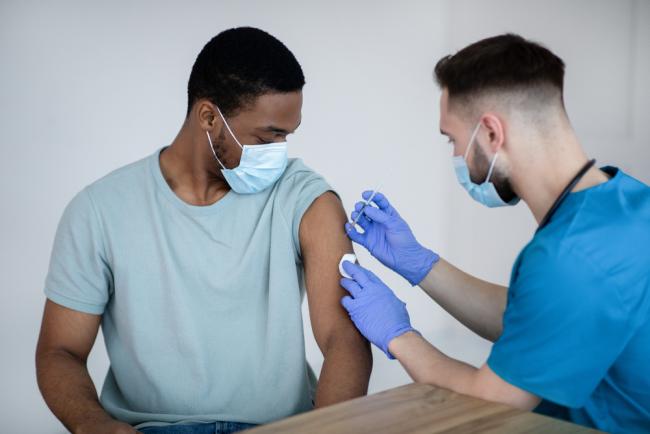Moderna COVID-19 vaccine generates long-lasting immune memory
October 5, 2021
Moderna COVID-19 vaccine generates long-lasting immune memory
At a Glance
- People who received low doses of the Moderna COVID-19 vaccine had strong immune memories of the virus six months after being fully vaccinated.
- Those carrying cross-reactive T cells from earlier exposure to other coronaviruses had greater immune responses after vaccination.
- The findings shed light on how lasting immunity develops after vaccination.

The Moderna and Pfizer mRNA vaccines against COVID-19 have shown greater than 90% effectiveness soon after the second dose. Studies suggest that protective immunity remains high, with only slight decreases, over six months. However, scientists are still working to understand how immunity against the virus develops after vaccination and changes over time.
Researchers believe that strong responses from both neutralizing antibodies and immune cells called T cells are necessary for immunity. Memory T cells linger in the body to recognize and protect against previously encountered pathogens. Recent studies indicate these may be crucial for lasting protection against COVID-19.
A research team led by Drs. Daniela Weiskopf, Shane Crotty, and Alessandro Sette of the La Jolla Institute for Immunology looked at immune memory six months after vaccination. They were also interested in how immune memory from previous exposure to coronaviruses, which can cause common colds, might affect the vaccine-induced immune response.
The work was primarily funded by NIH’s National Institute of Allergy and Infectious Diseases (NIAID). Results appeared in Science on September 14, 2021.
The study examined 35 participants enrolled in a phase 1 clinical trial of the Moderna vaccine. They had received two 25-microgram injections—a quarter of the standard dose authorized for emergency use by the FDA.
The team assessed antibody and T cell levels after the first and second doses, and again six months later. They measured two subsets of T cells: CD8+ T cells, or “killer” T cells, which destroy virus-infected cells, and CD4+ T cells, “helper” T cells involved in antibody production.
Levels of antibodies, CD4+ T cells, and CD8+ T cells remained strong six months after receiving the vaccine. This was found even among participants over 70 years of age, who are particularly vulnerable to severe COVID-19. Memory CD4+ T cells were still present in nearly everyone six months after full vaccination. Memory CD8+ T cells were detected in 67% of participants six months after full vaccination. Until this study, it was uncertain whether the Moderna vaccine elicited these memory T cells.
The team also found that the vaccine generated similar immune memory against the SARS-CoV-2 spike protein to that of natural infection. Levels of antibodies, CD4+ T cells, and CD8+ T cells six months after vaccination were comparable to those in recovered individuals.
In addition, the researchers found that “cross-reactive” T cells—those made during infection with other coronaviruses that can cause the common cold—enhanced the vaccine response. People with cross-reactive T cells before vaccination had significantly stronger CD4+ T cell and antibody responses.
Taken together, the study suggests that immune memory resulting from the Moderna vaccine, even at low doses, is long-lasting.
“The immune memory was stable, and that was impressive,” Crotty says. “That’s a good indicator of the durability of mRNA vaccines.”
—by Erin Bryant
Related Links
- Autoimmune Response Found in Many with COVID-19
- Early Treatment with Convalescent Plasma for COVID-19 Doesn’t Show Benefit
- Vaccines Prevented up to 140,000 COVID-19 Deaths in U.S.
- Intranasal COVID-19 Vaccine Effective in Animal Studies
- Most COVID-19 Hospitalizations Due to Four Conditions
- How COVID-19 Variants Evade Immune Response
- Coronavirus Prevention Network
References
Low-dose mRNA-1273 COVID-19 vaccine generates durable memory enhanced by cross-reactive T cells. Mateus J, Dan JM, Zhang Z, Rydyznski Moderbacher C, Lammers M, Goodwin B, Sette A, Crotty S, Weiskopf D. Science. 2021 Sep 14:eabj9853. doi: 10.1126/science.abj9853. Online ahead of print. PMID: 34519540.
Funding
NIH’s National Institute of Allergy and Infectious Diseases (NIAID); La Jolla Institute for Immunology.


